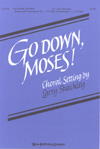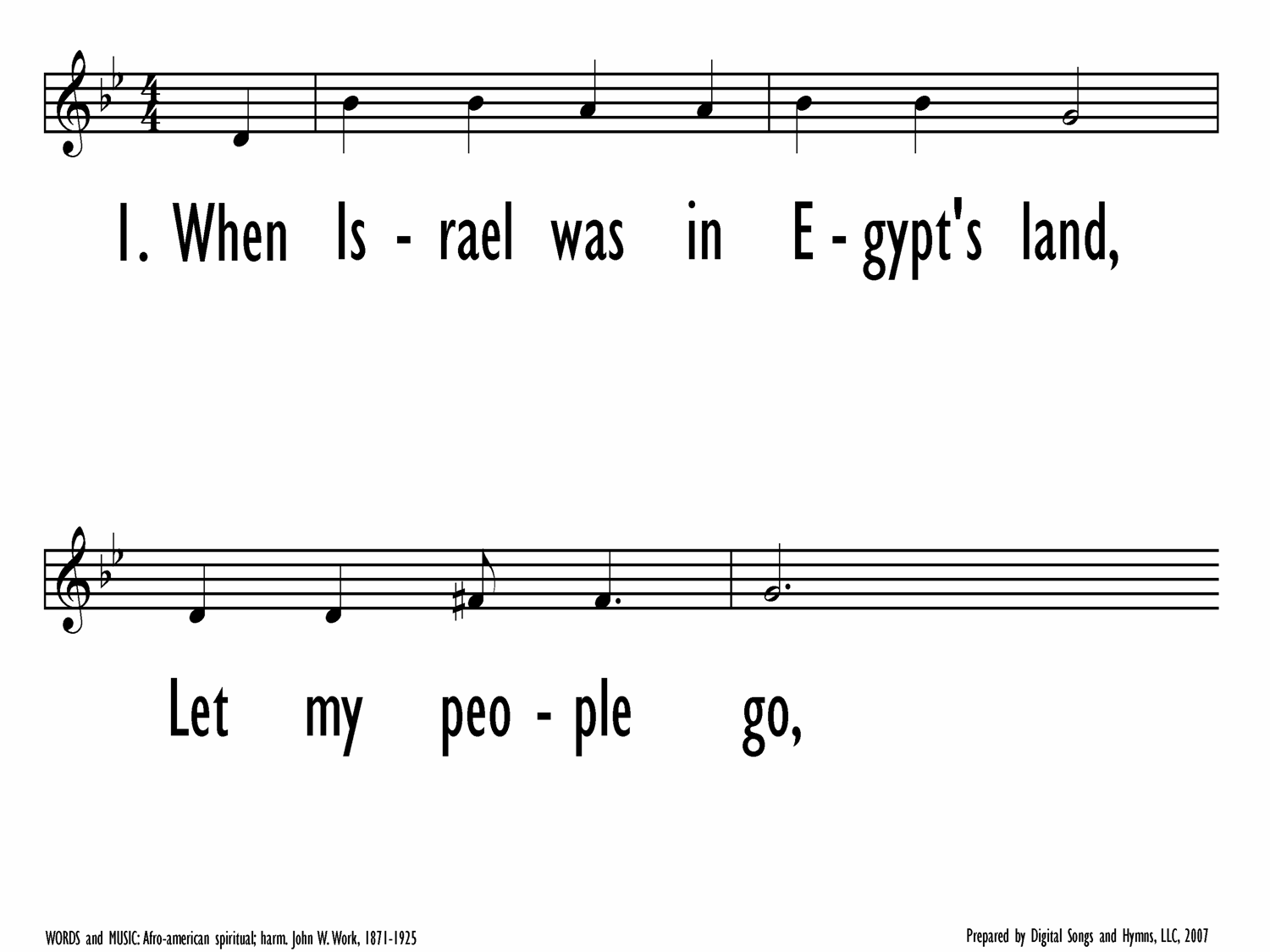- |
User Links
Go Down, Moses

When Israel was in Egypt's Land
Tune: GO DOWN MOSESScripture Songs
Published in 69 hymnals
Printable scores: PDF, MusicXMLPlayable presentation: Lyrics only, lyrics + musicAudio files: MIDI, Recording
Representative Text
1 When Israel was in Egypt's land,
Let my people go,
oppressed so hard they could not stand,
Let my people go.
Refrain:
Go down, Moses, way down in Egypt's land,
tell old Pharaoh: Let my people go.
2 The Lord told Moses what to do,
Let my people go,
to lead the Hebrew children through,
Let my people go. [Refrain]
3 As Israel stood by the waterside,
Let my people go,
at God's command it did divide,
Let my people go. [Refrain]
4 When they had reached the other shore,
Let my people go,
they let the song of triumph soar,
Let my people go. [Refrain]
5 Lord, help us all from bondage flee,
Let my people go,
and let us all in Christ be free,
Let my people go. [Refrain]
Psalter Hymnal, 1987
Text Information
Related Texts
| First Line: | When Israel was in Egypt's Land |
| Title: | Go Down, Moses |
| Meter: | Irregular |
| Source: | African-American spiritual |
| Place of Origin: | United States |
| Language: | English |
| Refrain First Line: | Go down, Moses |
| Copyright: | Public Domain |
| Liturgical Use: | Scripture Songs |
- Year A, Ordinary Time, Proper 17 (22)
This is recommended for Year A, Ordinary Time, Proper 17 (22) by 2 hymnal lectionary indexes including Glory to God: the Presbyterian Hymnal #52 and Lift Up Your Hearts: psalms, hymns, and spiritual songs #42. - Year B, Ordinary Time, Proper 7 (12)
English
- A Calendar of Hymns #d56
- A Collection of Revival Hymns and Plantation Melodies #86
- African American Heritage Hymnal #543
- Bible Songs on Timeless Themes #13
- Chalice Hymnal #663
- Community of Christ Sings #293
- Community of Christ Sings #294
- CPWI Hymnal #548
- Gather Comprehensive #715
- Glory to God: the Presbyterian Hymnal #52 10 shown out of 50
Spanish
Notes
Scripture References:
all st. = Ex. 7
This African American spiritual dates from before the Civil War. It was published in the Jubilee Songs (1872), made popular by the Jubilee Singers of Fisk University in their concert tours (see also PHH 356). Often known by its refrain line, "Go down, Moses," the spiritual was also published in J. B. T. Marsh's The Story of the Jubilee Singers with their Songs (1876). "When Israel Was in Egypt's Land" originally had twenty-four stanzas of which the Psalter Hymnal (as well as other modern hymnals) include four narrative stanzas and one stanza of application. Commenting on the spiritual’s message, John Lovell, Jr., writes:
"Go Down, Moses" does not employ the undercurrent symbolism of "Steal Away to Jesus" and other such poems. Only a very obtuse listener can miss its point. It says flatly that Moses freed these Egyptian slaves boldly and justly because slavery is wrong. It clearly projects the principles of this experience to all the world: wherever men are held in bondage, they must and shall be freed. The "Let my people go!" refrain is thunderous. It does not argue economic, sociological, historical, and racial points. . . . It wastes no words and moves relentlessly toward its goal of filling every listener with a pervasive contempt for oppression and a resounding enthusiasm for freedom.
-from Black Song, 1972, pp. 326-327
A stanza not printed in the Psalter Hymnal reiterates Lovell's point:
We need not always weep and moan
Let my people go!
And wear these slavery chains forlorn
Let my people go!
Psalter Hymnal is a prayer to God for freedom for all who are oppressed, a petition for liberation in Christ.
Liturgical Use:
Worship that focuses on the Old Testament Exodus event or on redemption for the oppressed and freedom in Christ; Easter Vigil service.
--Psalter Hymnal Handbook
Tune
GO DOWN MOSESThe spiritual is in the call-and-response pattern: a leader sings the verses with some rhythmic freedom, either unaccompanied or with only light accompaniment; the entire congregation sings the phrases "Let my people go!" and the refrain, probably in harmony. That practice fits well for stanzas 1-4,…
For Leaders
Text:
The text of this spiritual originated among the slaves in the South of the United States before the Civil War. It was transcribed by Lewis Lockwood from the singing of some refugee slaves in 1861, and was published in December of that year in the National Anti-Slavery Standard. The original text was quite long, with over twenty stanzas. Modern hymnals typically print four or five stanzas. The theme of the song is fairly uniform. It is about demanding freedom from oppression in unequivocal terms.
Tune:
The tune presumably developed with the words. It is often named GO DOWN MOSES after the text, but sometimes it is called TUBMAN, after Harriet Tubman, the ex-slave who helped others escape and who was called the “Moses of her people.” This spiritual tune is designed for call-and-response singing. The music for the unique lines of the stanza text should be sung by a solo voice or by a group in unison, with the entire congregation singing in harmony on “Let My people go” and the refrain.
When/Why/How:
This hymn is obviously well-suited to worship services on the themes of the Exodus story or, more generally, freedom and oppression. The authority of God to compel Pharaoh to “let My people go” is brought across quite well in a fiery, energetic arrangement of this spiritual for organ and piano duet as the first movement of "A Symphony of Spirituals." More typical choral arrangements include a short a capella setting of "When Israel Was in Egypt's Land," with an ostinato line for the bass voices, and "Go Down, Moses," a dynamically expressive arrangement for choir and soloists in call-and-response style with subtle organ accompaniment.
Tiffany Shomsky, Hymnary.org
Timeline
Arrangements
Media
Psalter Hymnal (Gray) #476
- MIDI file from The Cyber Hymnal #7404
- Audio recording from Glory to God: the Presbyterian Hymnal #52
- Audio recording from Lift Up Your Hearts: psalms, hymns, and spiritual songs #42
- Audio recording from Psalter Hymnal (Gray) #476
- MIDI file from Psalter Hymnal (Gray) #476
- MIDI file from Psalter Hymnal (Gray) #476
- Audio recording from The United Methodist Hymnal #448
- MIDI file from Worship and Rejoice #618


 My Starred Hymns
My Starred Hymns





